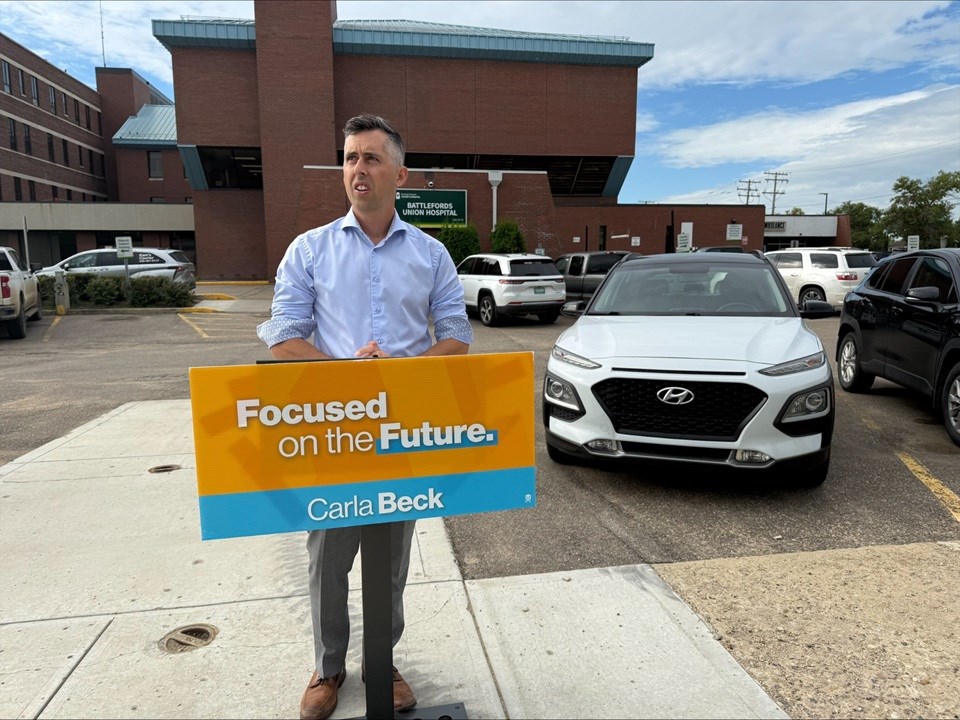NORTH BATTLEFORD - The Saskatchewan NDP is raising issues about rural and remote healthcare disruptions during a tour of the local area.
Saskatchewan NDP Shadow Minister for Rural and Remote Health Jared Clarke spoke outside the Battlefords Union Hospital during a visit to North Batleford on Aug. 12.
"Over the coming weeks, I'll be visiting as many rural and northern communities and cities like North Battleford to shine a light on the service closures that are hurting families and putting lives at risk," he said. "Because make no mistake, we are in a healthcare crisis and the Sask Party government is making it worse. Over the past six years, we've seen increasing numbers of service disruptions in maternity wards, ERs, diagnostic labs, surgical units, CT and MRI scanners, and so much more. Now these aren't isolated incidents, they are part of a dangerous pattern that's putting care further and further out of reach for rural and remote communities."
Clarke said in the last 18 months, there have been 643 disruptions to healthcare facilities lasting 3,362 days.
"What started as ER and surgical closures has now expanded into almost every part of our health care system," he said.
Clarke noted the Battlefords Union Hospital experienced 609 days of healthcare disruptions.
"Now it's unusual for service disruptions in the province to be longer than 10 days, but 13 of the Union Hospital's 44 disruptions ranged from 11 to 151 days. And the longest disruption between June and November of 2019 to intensive care services lasted 151 days," he said. "Now between 2022 and February of 2023, there was a 48-day outage to intensive care and a 33-day outage for CT scans."
Clarke said the Sask Party needs to advise people if there are disruptions to services and closures at hospitals.
"People show up at their local hospital because they need care," he said. "And what they're finding is a sign on the front door telling them that services are not available."
Saskatchewan Health Minister Jeremy Cockrill told SaskToday that the province is working on solutions to heathcare service disruptions.
"We are working hard to address these issues and seeing success I would say through the virtual physician program in many rural communities, through point-of-care lab testing, which allows more lab work to happen in the emergency room as opposed to waiting for a traditional lab result, and then most importantly through the rural and remote recruitment incentive," he said.
He also noted that North Battleford "is the most successful community in the province" in terms of filling tull-time positions through the rural and remote recruitment incentive program.
"We have filled 98 positions, full-time positions in the healthcare sector, just in North Battleford alone over the last couple of years through our incentives," Cockrill said. "Eight of those positions are just since the first of April."
Cockrill was critical of the NDP for not providing any plan or solutions themselves.
"They should go back to Regina and not come back until they have ideas," he said. "We never hear ideas from them; we never hear a plan on what they would do."
"I think it's important the government is responding with innovative solutions...," he added. "Patients and communities are looking for innovative responses to the challenges in healthcare that we see. That's why we're focused on that."
Cockrill said that's why the province continues to use initiatives like point-of-care testing and the virtual physician program.
'That's why we have the rural and remote incentive," he added, "to make sure that we can fill positions and make sure that services are there for people when they need it closer to home."
Clarification: The original story noted the longest disruption between June and November of 2019 to emergency services lasted 151 days, according to the NDP. In fact, it was to intensive care services instead.




